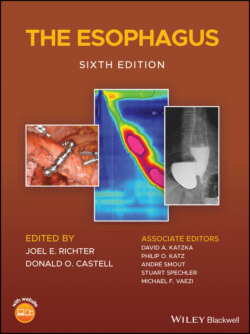Читать книгу The Esophagus - Группа авторов - Страница 100
Pathophysiology
ОглавлениеAlthough the mechanism for rumination is thought to be self‐taught with unconscious maneuvers that facilitate flow of gastric content into the esophagus and mouth, it is unclear what the initiates these events. It is hypothesized that it may commence as a defensive response to something noxious that is consumed. This could be an episode of pill sticking or response to a specific food, eating in general, or an abnormal sensory response. Once incorporated into the patient’s routine, the basic pathophysiologic abnormality appears to be a reversal of the normal pressure gradient between esophageal and stomach [10]. Specifically, patients with rumination have augmentation of gastric pressure that exceeds a reduction of lower esophageal sphincter pressure. This increase in gastric pressure is thought to be achieved through contraction of the intercostal and anterior abdominal muscles, as demonstrated through EMG recordings [11]. Another contributor to the increase in gastric pressure may be decreased gastric compliance, though data demonstrating this has been inconsistent. There is also a reduction in LES pressure and thoracic pressure, helping to achieve retrograde flow of gastric content. One of the many remaining mysteries in rumination syndrome is precisely how patients accomplish it. If one asks a normal volunteer or a patient with rumination to regurgitate gastric content, with rare exceptions, it cannot be done on command.
There may be other contributors to rumination. For example, some episodes of regurgitation are associated with an initial air swallow and belch. The belch reflex may be what achieves initial opening of the LES for the remainder of the content to flow. Conversely, the gastric strain needed to expel a supragastric belch may also contribute. Regurgitation events may also occur with an initial reflux episode, with the transient lower esophageal sphincter relaxation the facilitating event for rumination.
Psychologic factors have also been proposed as a cause of rumination syndrome, and in many studies patients with rumination score higher on anxiety testing, but how this contributes to the syndrome is unclear. One hypothesis might be that after the onset of rumination behavior, psychologic factors maintain the behavior [2]. Some data associates rumination to eating disorders [12], perhaps leading to its classification as a “Feeding and Eating Disorder” by the Diagnostic and Statistical Manual of Mental Disorders, 5th ed. [13].
